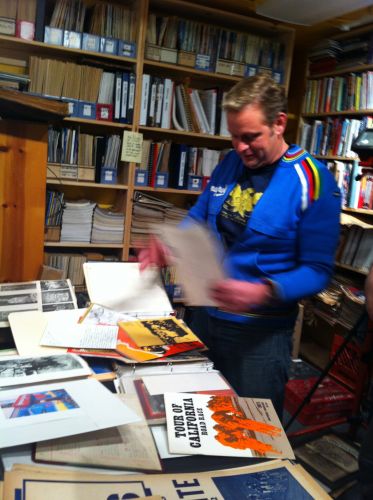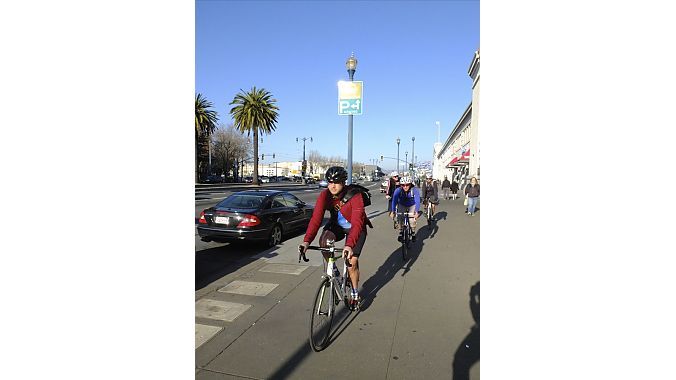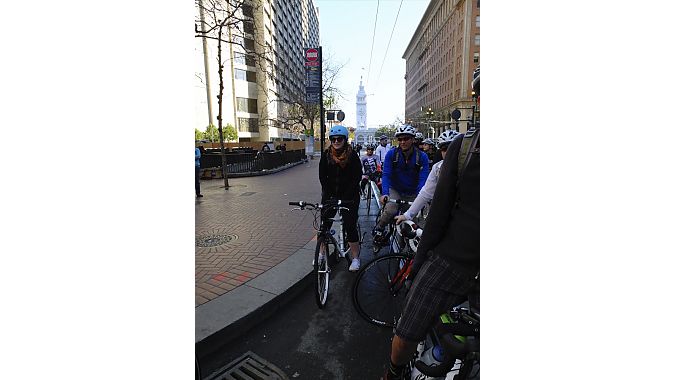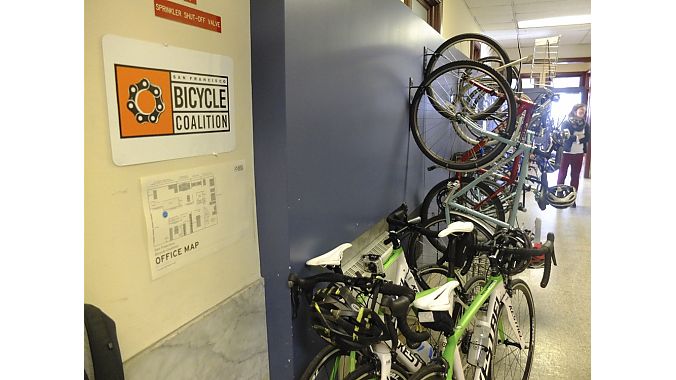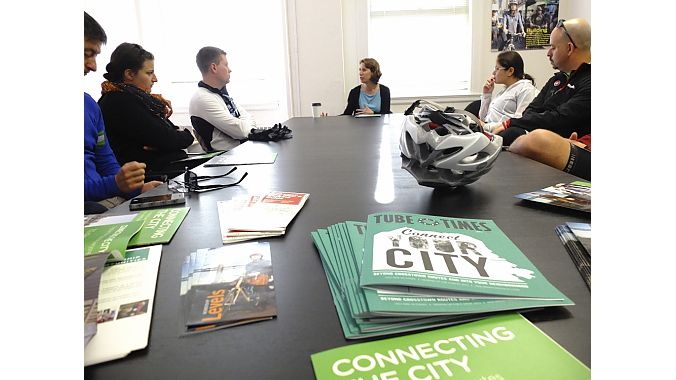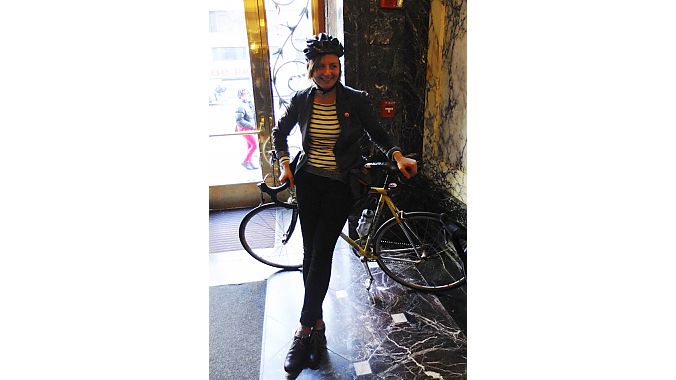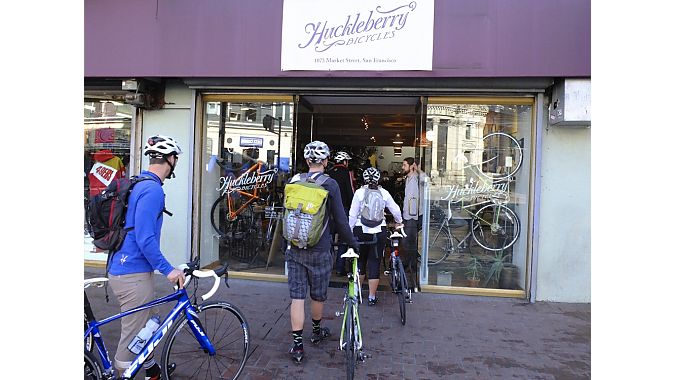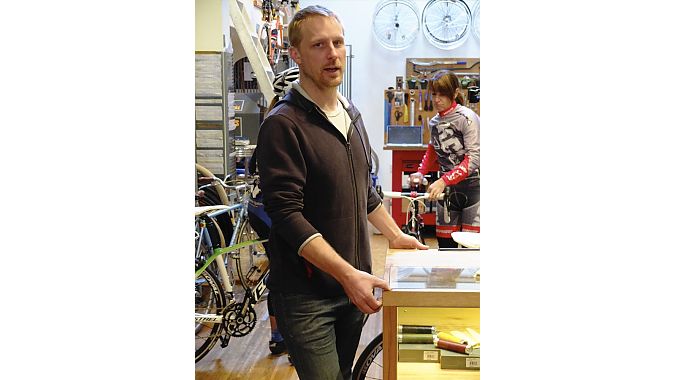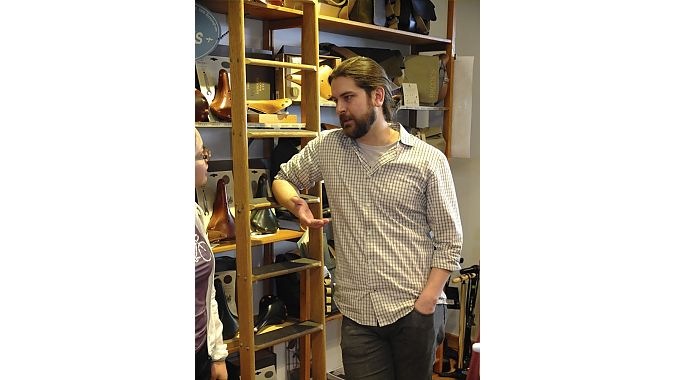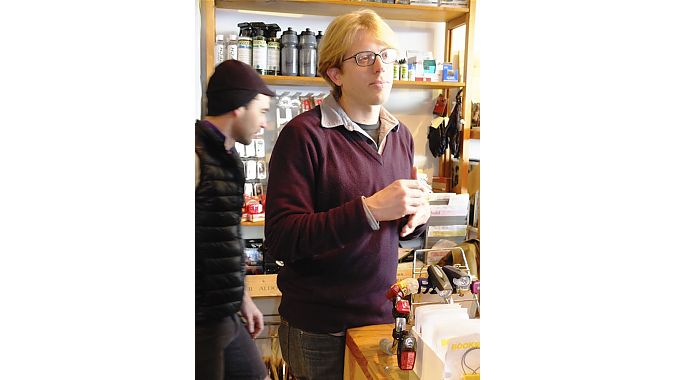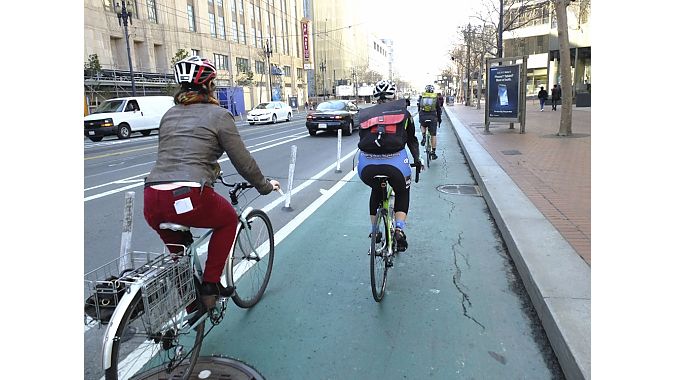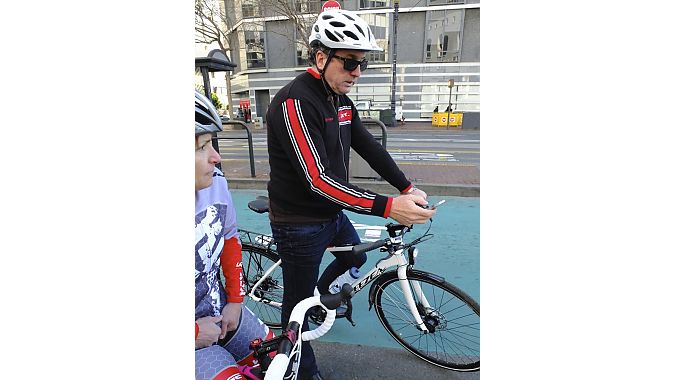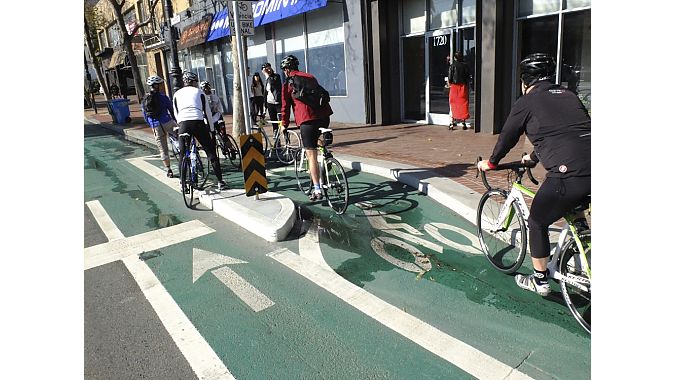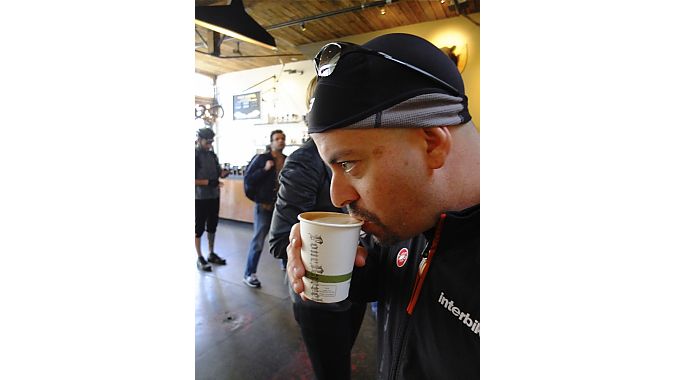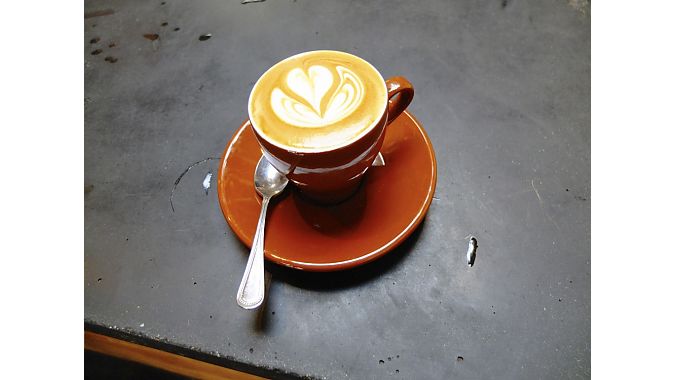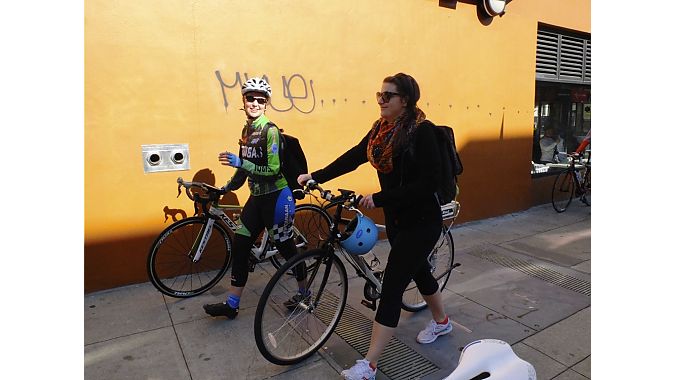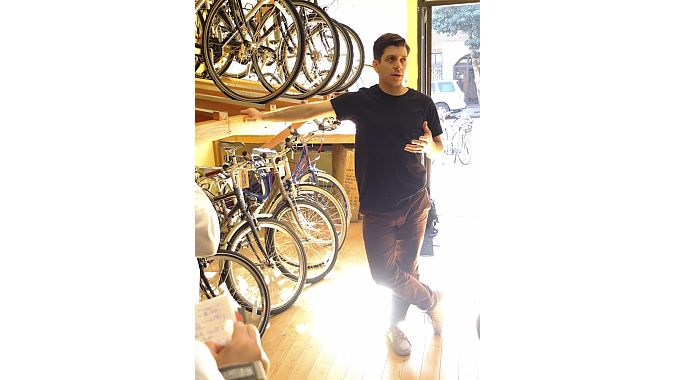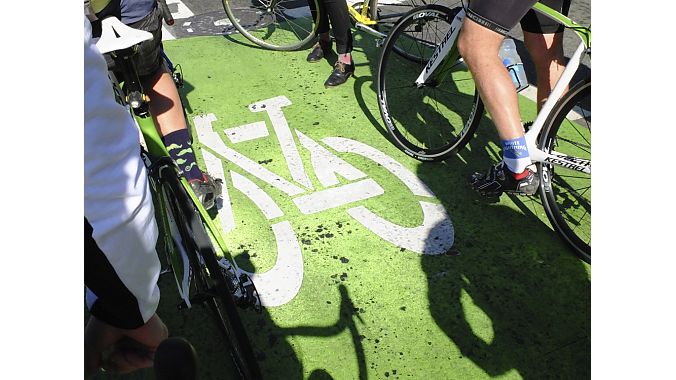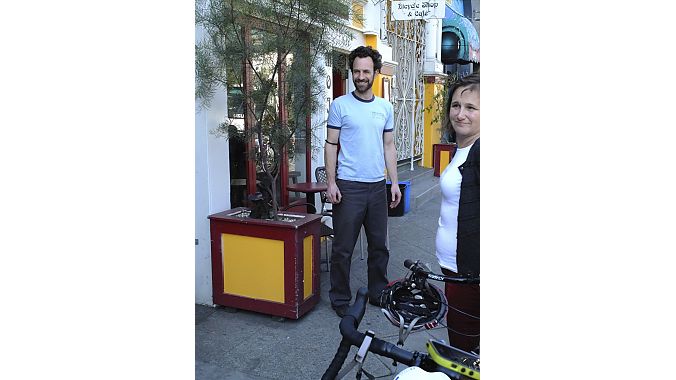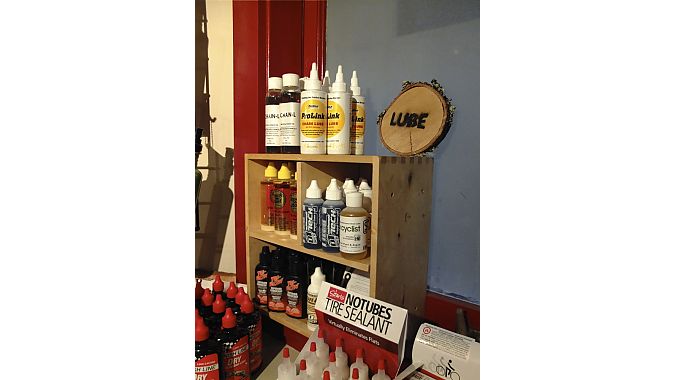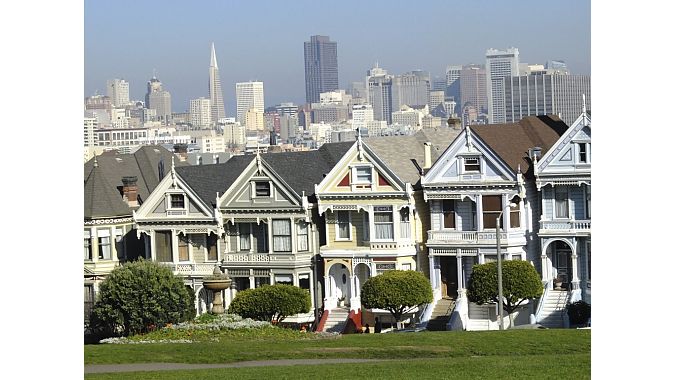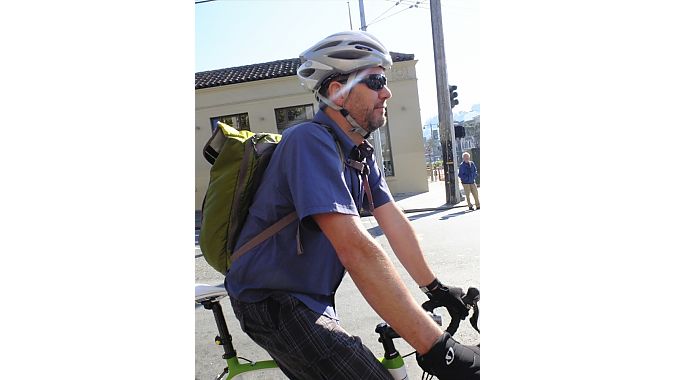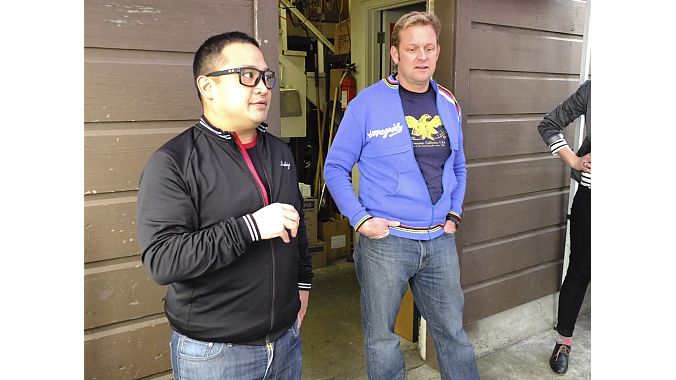SAN FRANCISCO, CA (BRAIN) — The BRAIN Dealer Tour of San Francisco wrapped up Thursday with a 20-mile jaunt around the city, ably led by folks from the San Francisco Bicycle Coalition, who for the most part managed to route us around the steepest hills as we visited four shops, including one combination bike shop/cafe.
We discovered a healthy market, with deep traditions in recreational road and mountain bike riding, supplemented by a skyrocketing use of bikes for commuting (up 70 percent in the last five years). Our trip wrapped up with a thrilling descent from The Presidio's Inspiration Point back down to sea level.
Be sure to check our March issue for a complete report. You'll also find various outtakes and conversations developing on our Facebook page and on Twitter, where you can search the hashtag #braindealertour to see postings from various tour participants.
Here's a quick look at some of the stops we made Thursday:
Huckleberry Bicycles
Three friends pooled their savings and together with a small business loan launched this shop on Market Street — a heavily trafficked bike commuter route — just over a year ago. Their target was urban bikes and lifestyle apparel, though Huckleberry also sells high-end road, ‘cross and touring bikes. Huckleberry will often take a traditional dropbar road bike from a brand such as Masi and add wide-sweep handlebars, racks and baskets, said Zack Stender, one of the owners. (The other two are Jonas Jackel and Brian Smith.)
They’ve gone to great lengths to make Huckleberry less intimidating to new cyclists—from the store name, to its lighting, uncluttered merchandising and handpicked, chic, fashion-inspired bike commuter apparel and accessories from brands such as Pedaled, Cadence, Levi’s, Chrome, Swrve and Brooks, to name a few.
Stender, who sits on the board of directors of the San Francisco Bicycle Coalition, realizes the connection between advocacy and getting more people on bikes and supports the Coalition by selling memberships and holding fundraisers. “They’re out here fighting to put bike lanes on the street; their free bike valet is the best resource for many local events and parties.”
Huckleberry also harbors goodwill in its community by offering free repairs from 7:30 to 9:30 weekday mornings at a former newsstand kiosk. The pop-up service stand handles minor repairs such as flat fixes, creaks, brake tightening or derailleur adjustments. “We’ve gotten flack for giving up free repair, but we want to keep people moving and happy,” Stender said. “People love it. We get a lot of comments on Twitter and Facebook.”
Blazing Saddles
Jeff Sears’ rental business—Blazing Saddles—was the home base for the pick up and drop off of the Fuji and Kestrel bikes we rode this week in the Bay Area. It has thrived for 25 years and now has seven locations in San Francisco, two in New York City and one in Monterey.
Anchoring its success is San Francisco’s tourist appeal. There’s such high demand for sightseeing on two wheels, that 17 different businesses rent bikes within a half-mile radius of its Beach Street location, Sears said. His fleet covers every taste and skill level—from a basic hybrid to full-suspension off-road bikes, hardtail 29ers, carbon road and even tandems, pedal assist and triathlon bikes. For this year’s Escape from Alcatraz triathlon, athletes have already reserved 200 bikes, he said.
Sears, who worked at Fisherman’s Wharf since high school, acquired the business after 9/11. He said the rental business saw a big boom after the Presidio transitioned from a military base to a national park, opening access to bikes on the waterfront. And he’s banking on further developments along the northern waterfront that will make it more accessible to bikes and pedestrians.
Other than rentals, Blazing Saddles also does guided tours and sells a few electric bikes from Stromer and Ultra Motor, mostly to city dwellers working in the financial district. “We’re trying to open an e-bike specific retail location this year because we think the public is missing out,” Sears said. “We want to have a separate place to have that conversation.”
Box Dog Bikes
With transportation, touring and randonneur bikes from Jamis, Breezer and QBP’s Surly and All-City, Box Dog Bikes’ core customer is summed up thusly: “I think people in San Francisco are looking for something they can do everything on, whether it’s commuting in the city or riding weekends in Marin,” said Emily Conner, one of five staffers who work alongside four employee-owners of the 9-year-old shop.
Box Dog occupies two ends of the utility bike business: $500 to $600 built bikes and more sophisticated custom builds on the shop’s fillet-brazed Dedacciai double-butted steel 650b Pelican randonneur frameset, or other small-batch frames as Velo Orange’s Rando or Polyvalent “low trail” frame.
The $1,600 Pelican frame and fork are made for Box Dog by Wisconsin’s Winter Cycles, are compatible with both V-brakes and cantilevers, and accept 700x35 tires with fenders—plenty to safely traverse trolley tracks and smooth out the cracks and grates of The City’s busy streets.
Mojo Bicycle Café
This combination bike shop and café earned its rep early on with practical commuter and city bikes as much as it did with its appealing menu of sandwiches, coffees, teas and craft beers. Since that time, however, Mojo has entered what owner Remy Nelson terms its “teenage years”--where shop customers are transitioning from utility bikes to the next level of cycling.
“It’s plain as day there’s a commuter market here, but more of those riders are getting into higher-end steel and carbon road bikes,” said Rona Hung, a former marketing manager for Breezer Bikes who now does retail sales and merchandising for Mojo.
So in addition to the sub-$1,000 Jamis transportation bikes that dominate the small 900-square-foot sales and retail space at the back of the café, Mojo also does an increasing number of custom builds on framesets from Rock Lobster, Soma and Surly, as well as Jamis’ higher-end carbon models.
Mojo’s sales split 50/50 between café and bike shop, Nelson said, and in addition to the caffeine and IPA-fueled neighborhooders who wile away long afternoons in the quaint “parklet” along the sidewalk, you’re likely to spot one familiar face should you stick around long enough.
“Gary Fisher’s here almost every day,” said Nelson.
American Cyclery
The oldest shop in San Francisco, American Cyclery was founded by six-day racer Oscar Juner in 1941. The store is as much a museum as a retail outlet, with photos of Juner scattered about, and rumors of a ghost that likes to move old trophies about.
The store now is run out of two locations, across the street from one another, owned by Bradley Woehl and Kimo Toguchi.
Stanyon Street was once a legendary avenue of bike shops, with stores shoulder-to-shoulder up and down the hill (at one point most of them were owned by one family). Now just three shops remain as high real estate values drove them out. American Cyclery is now rebuilding the exterior of its oldest location, replacing an old store-front mural that was disintegrating. Out front, a parking space or two is being replaced with one of the city's new "parklets," a public space for recreation and relaxation. Plans call for a velodrome-themed mini-park. The store also has received an arts grant to replace the mural and is considering artists for the job.
Its collection of old and new gear attracts bike geeks from all over, including local actor Robin Williams and Nate Query, the bassplayer in the Decemberists. Woehl maintains an archive of magazines, brochures, catalogs and other materials in the basement. Among the treasures is an early hand-written sales note from Specialized founder Mike Sinyard.
Woehl concedes he loves spending time in the archive. "When there's not a lot of business I can come down here and dig around and try to organize," he said, happily running his hands over a pile of magazines.
City Cycle
Cory Farrer doesn't stop moving much, even when he's dealing with the first signs of an impending cold, as he was when the Dealer Tour made his store the last stop on our Bay Area jaunt. Farrer took over one of the city's landmark shops in 2010, buying it from the widow of legendary retailer Clay Mankin, who had died suddenly on a bike tour in 2005.
Farrer already owned Paradigm Cycles in Marin. Last year he greatly expanded that shop, renaming it City Cycles. "This (the San Francisco store) was once the big store, now it's the little store," he said.
While the city store was established as a high-end custom destination, Farrer has broadened its reach by adding Trek, which joins custom brands like BMC and Seven on the floor. The move was well-timed with the financial collapse after 2008; many of the store's best customers work in the financial industry.
With the economy on the rebound, Farrer is looking to bring back some more of the "nichy" brands, while also planning a remodeling of the store, changing its bike displays and repainting the walls, adding more art.
"You can't stand still," Farrer said.

